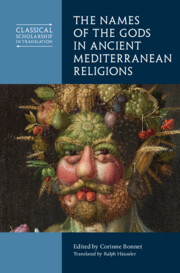Book contents
- The Names of the Gods in Ancient Mediterranean Religions
- Classical Scholarship in Translation
- The Names of the Gods in Ancient Mediterranean Religions
- Copyright page
- Dedication
- Contents
- Figures
- Tables
- Contributors
- Acknowledgements
- Foreword
- Abbreviations
- Introduction In the Mirror of Vertumnus
- Chapter 1 ‘To the Immortals Everything Is Possible’
- Chapter 2 All Sides of the Moon
- Chapter 3 ‘May the Force Be With You!’
- Chapter 4 Dionysos in the Mirror of Poseidon
- Chapter 5 Lord of the Universe, the World and Eternity
- Chapter 6 This Is Not a Name
- Chapter 7 The Sword and the Patera
- Chapter 8 A Travelling Portrait
- Chapter 9 Pantheus, a ‘Total’ God in the Greek and Roman World
- Chapter 10 ‘I Will Be Who I Will Be’ (Exod. 3:14)
- Chapter 11 Golden Locks Among the Greeks, or the Hair Secrets of the Beautiful Apollo
- Chapter 12 Athena – Artemis
- Epilogue
- Bibliography
- Index
Chapter 5 - Lord of the Universe, the World and Eternity
Gods with Unlimited Powers in Palmyra?
Published online by Cambridge University Press: 23 February 2024
- The Names of the Gods in Ancient Mediterranean Religions
- Classical Scholarship in Translation
- The Names of the Gods in Ancient Mediterranean Religions
- Copyright page
- Dedication
- Contents
- Figures
- Tables
- Contributors
- Acknowledgements
- Foreword
- Abbreviations
- Introduction In the Mirror of Vertumnus
- Chapter 1 ‘To the Immortals Everything Is Possible’
- Chapter 2 All Sides of the Moon
- Chapter 3 ‘May the Force Be With You!’
- Chapter 4 Dionysos in the Mirror of Poseidon
- Chapter 5 Lord of the Universe, the World and Eternity
- Chapter 6 This Is Not a Name
- Chapter 7 The Sword and the Patera
- Chapter 8 A Travelling Portrait
- Chapter 9 Pantheus, a ‘Total’ God in the Greek and Roman World
- Chapter 10 ‘I Will Be Who I Will Be’ (Exod. 3:14)
- Chapter 11 Golden Locks Among the Greeks, or the Hair Secrets of the Beautiful Apollo
- Chapter 12 Athena – Artemis
- Epilogue
- Bibliography
- Index
Summary
This paper deals with the Palmyrene divine title MR ‘LM’ which can be translated as Master of the World, of the Universe or of the Eternity. As a point of departure, it takes the theory of relativity and the sense of the time and space in the reference to the divine competences. Does the god called by this particular name have unlimited power, when he is the ruler of the entire universe and time? This paper shows the equal relevance of the title to the two Palmyrene gods: Bel and Baalshamin, remembering the transdivine character of the epithets
Keywords
- Type
- Chapter
- Information
- The Names of the Gods in Ancient Mediterranean Religions , pp. 95 - 110Publisher: Cambridge University PressPrint publication year: 2024
- 1
- Cited by

